|
|
|
Sort Order |
|
|
|
Items / Page
|
|
|
|
|
|
|
| Srl | Item |
| 1 |
ID:
104405
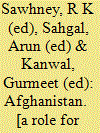

|
|
|
|
|
| Publication |
New Delhi, KW Publishers, 2011.
|
| Description |
xvi, 192p.
|
| Standard Number |
9789380502526, hbk
|
|
|
|
|
|
|
|
|
|
|
|
Copies: C:1/I:0,R:0,Q:0
Circulation
| Accession# | Call# | Current Location | Status | Policy | Location |
| 056000 | 327.540581/SAW 056000 | Main | On Shelf | General | |
|
|
|
|
| 2 |
ID:
153617
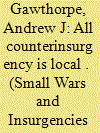

|
|
|
|
|
| Summary/Abstract |
Although the concept of legitimacy is central to Western counterinsurgency theory, most discourse in this area black-boxes the concept. It hence remains under-specified in many discussions of counterinsurgency. Fortunately, recent research on rebel governance and legitimacy contributes to our understanding of the problems faced by counterinsurgents who want to boost state legitimacy while undermining that of the rebels. Taken together, this research illustrates that a rational choice approach to legitimacy is simplistic; that micro-level factors ultimately drive legitimacy dynamics; and that both cooption of existing legitimate local elites and their replacement from the top–down is unlikely to succeed. Western counterinsurgency doctrine has failed to grasp the difficulties this poses for it.
|
|
|
|
|
|
|
|
|
|
|
|
|
|
|
|
| 3 |
ID:
078965
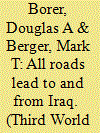

|
|
|
|
|
| Publication |
2007.
|
| Summary/Abstract |
This concluding article returns to some of the key themes of this volume in relation to insurgency, counter-insurgency and collapsing states. In particular it attempts to characterise the relationship between the Long War and the Cold War, in relation to the transformation of the nation-state system. More broadly it emphasises that the Cold War was an often misdirected, militarised struggle between 'genuinely existing' liberal capitalism and 'genuinely existing' state socialism (the First World and the Second World) against each other and for influence and power in the erstwhile Third World. The Long War, meanwhile, reflects both the triumph of 'genuinely existing' liberal capitalism as the dominant form of secular modernity over an equally, if not more virulently secular 'genuinely existing' state-socialism, and the emergence of an anti-secular neo-traditionalism (often, but not exclusively, Islamic) at both the nation-state and the transnational level. At the same time the binary that drove the Cold War and led to considerable bloodshed, was often characterised by contradictions within the two main ostensible challengers which were as potent as those between them. This is also the case in relation to Islamic revivalisms and their neo-traditional challenges to secular modernity and 'genuinely existing' liberal capitalism. (In fact, it is worth noting, that although Islamic fundamentalisms are at the forefront of the neo-traditional revival, there are other religious-based neo-traditionalisms seeking to counter the global spread of 'genuinely existing' liberal capitalism.) We conclude that the 'real' Long War may be a struggle within the 'Muslim world' rather than the ostensible struggle between the 'West' and 'Islam'
|
|
|
|
|
|
|
|
|
|
|
|
|
|
|
|
| 4 |
ID:
142605
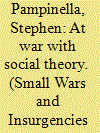

|
|
|
|
|
| Summary/Abstract |
As US counterinsurgency campaigns draw to a close, doctrine for asymmetric warfare written during the War on Terror has come under heavy criticism. While many have argued that this shift to ‘winning hearts and minds’ is evidence that the United States is taking humanitarianism and nation-building seriously, others argue that a wide gap exists between US counterinsurgency doctrine and the protection of civilians afflicted by conflict. In this article, I show that the latter is true by comparing theories of instrumental and communicative action to US doctrine for operational design, stability operations, and counterinsurgency. I argue that these texts treat the people as an object to be manipulated for the achievement of pre-determined self-interested strategic goals rather than members of a community that jointly designs operations to fulfill shared objectives. However, US doctrine does contain communicative elements that, if prioritized, would better support humanitarian and state-building objectives otherwise subordinated in the War on Terror.
|
|
|
|
|
|
|
|
|
|
|
|
|
|
|
|
| 5 |
ID:
074845
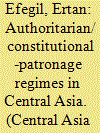

|
|
|
| 6 |
ID:
161048
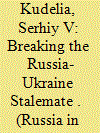

|
|
|
|
|
| Summary/Abstract |
This paper examines Russian-Ukrainian relations of the past four years in the context of the present political regime in Ukraine and the interests of its ruling elite. It focuses on the fundamental changes in the Ukrainian leadership’s foreign policy strategy and points to long-term risks associated with Kiev’s hopes that Western patronage will help strengthen its security. In conclusion, the author considers three scenarios for the development of the Ukrainian state in the coming decade and analyzes their possible consequences for Russian-Ukrainian relations.
|
|
|
|
|
|
|
|
|
|
|
|
|
|
|
|
| 7 |
ID:
103592
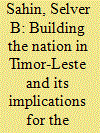

|
|
|
|
|
| Publication |
2011.
|
| Summary/Abstract |
This article contributes to the discussion of the international democratisation of the so-called 'post-conflict' or 'fragile' countries by addressing one of the most important but least studied issues in the literature-the relationship between democracy and nation-building. It does so by analysing the major socio-political aspects of the democratic nation-state-building process in Timor-Leste in the post-1999 period. It argues that contemporary international democratisation policies and practices prioritise the 'stateness' problem, conceptualised by reference to a set of organisational, procedural and functional concerns. Little attention is, however, paid to the 'nationness' question. As the experience in Timor-Leste indicates, it is the national ideas that determine the structural and operational parameters of democratisation, which is, after all, a process of socio-political transformation by which political power and wealth are redistributed amongst a variety of competing societal interests.
|
|
|
|
|
|
|
|
|
|
|
|
|
|
|
|
| 8 |
ID:
103593
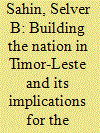

|
|
|
|
|
| Publication |
2011.
|
| Summary/Abstract |
This article contributes to the discussion of the international democratisation of the so-called 'post-conflict' or 'fragile' countries by addressing one of the most important but least studied issues in the literature-the relationship between democracy and nation-building. It does so by analysing the major socio-political aspects of the democratic nation-state-building process in Timor-Leste in the post-1999 period. It argues that contemporary international democratisation policies and practices prioritise the 'stateness' problem, conceptualised by reference to a set of organisational, procedural and functional concerns. Little attention is, however, paid to the 'nationness' question. As the experience in Timor-Leste indicates, it is the national ideas that determine the structural and operational parameters of democratisation, which is, after all, a process of socio-political transformation by which political power and wealth are redistributed amongst a variety of competing societal interests.
|
|
|
|
|
|
|
|
|
|
|
|
|
|
|
|
| 9 |
ID:
066100
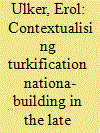

|
|
|
| 10 |
ID:
052224
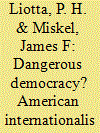

|
|
|
| 11 |
ID:
189549
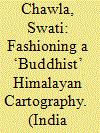

|
|
|
|
|
| Summary/Abstract |
In the months leading up to the transfer of power in India, the eastern Himalayan kingdom of Sikkim made several representations to the Cabinet Mission and other constitutional bodies that were giving shape to the successor Indian government. The Sikkim Darbar was worried that its ambiguous position under colonial treaties might lead India to treat it as one of the five-hundred odd princely states that were slowly merging with the union. In letters, memoranda, legal briefs, and personal meetings, the Darbar argued that it was racially, religiously, socially, and culturally distinct from India, and that its allegiance lied to its north with Tibet. This article traces the vocabulary for the Sikkim Darbar’s assertion of difference from India back to the racialised imperial writing and realpolitik that had informed colonial policy towards the Himalayan states since the nineteenth century, most notably Olaf Caroe’s 1940 thesis on the ‘Mongolian Fringe’. This archival evidence emphasises Sikkimese agency and helps excavate an imagination of the Himalaya from within the region. The article also nuances the history of the forging of Indian republic by foregrounding the processes of negotiation and compromise that continued to shape the territorial contours of the Indian nation long after the moment of decolonisation.
|
|
|
|
|
|
|
|
|
|
|
|
|
|
|
|
| 12 |
ID:
178008
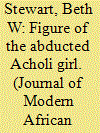

|
|
|
|
|
| Summary/Abstract |
Based on analysis of newspapers and secondary sources, this article examines the gendered construction of the national imagery of the war between the Ugandan government and the Lord's Resistance Army (LRA) in an effort to expand current conceptual understanding of the exclusion experienced by children born of forced marriage inside the LRA. Uganda developed as a militarised and masculine post-colony and yet nation-building for President Museveni involved crafting a national imagery that drew upon development discourses of gender and children to position himself as the benevolent father of the nation. Invoking Veena Das’ ‘figure of the abducted woman’, I argue that the Ugandan government mobilised the figure of the abducted Acholi girl to legitimise both its governance and the war. The article concludes that the resulting narrative provided no legitimate social or political space in the national imagery for the children of the abducted girls.
|
|
|
|
|
|
|
|
|
|
|
|
|
|
|
|
| 13 |
ID:
181870
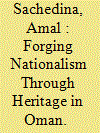

|
|
|
|
|
| Summary/Abstract |
During his five-decade reign, Sultan Qaboos bin Said relied on heritage as a key tool for nation-building. Old forts and objects central to Omani traditional culture like the coffee urn and the ceremonial dagger became symbols of a unifying national ethos. At the same time, their former political significance was downplayed. But some Omanis have held onto memories of a different conception of the past. And now, after the sultan’s death in 2020, heritage is becoming more of a privatized business sector.
|
|
|
|
|
|
|
|
|
|
|
|
|
|
|
|
| 14 |
ID:
159803
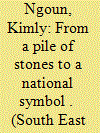

|
|
|
|
|
| Summary/Abstract |
Existing studies of the Cambodia-Thailand conflict over the Khmer temple of Preah Vihear tend to regard the temple as nationally significant to both countries. However, little is known about how the border temple complex has emerged from obscurity to symbolize the nation in Cambodian nationalist discourse. Therefore, this article seeks to examine the stakeholders, contexts, and specific political situations implicated in the emergence of the ancient temple as a site of national significance. It links the temple’s rise to national prominence in Cambodia to the broader context of Prince Norodom Sihanouk’s politics of postcolonial nation-building. I argue that Sihanouk had a strong stake in the temple and the conflict over it with Thailand. His investment in the project of nationalism in relation to the temple was an important resource in pursuing his wider political objectives in building the post-independence Cambodian nation.
|
|
|
|
|
|
|
|
|
|
|
|
|
|
|
|
| 15 |
ID:
161047
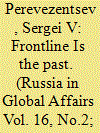

|
|
|
|
|
| Summary/Abstract |
This article studies several methods of assessing historical reality—“interpretation,” “mythologization,” “falsification,” and “folk history”—and describes all four of them. Based on this classification, the author analyzes the historical substantiation of nation-building in the modern Ukrainian state. The facts and theories used in this article convincingly prove that, unfortunately, by rejecting the data provided by Ukrainian and world science, Ukrainian politicians are building “a single Ukrainian nation” mainly by falsifying history and even using folk history. Such historical policy dramatically whips up political, ethnic, and religious tensions in the country and has negative consequences for the Ukrainian state.
|
|
|
|
|
|
|
|
|
|
|
|
|
|
|
|
| 16 |
ID:
071667
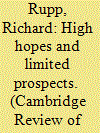

|
|
|
|
|
| Publication |
2006.
|
| Summary/Abstract |
Four years have passed since the United States and allied governments toppled the Taliban in Afghanistan and began security and nation-building operations. Despite the continuing deployment of thousands of Western troops and the expenditure of billions of dollars in foreign aid, current conditions in Afghanistan are perilous. Poverty is rampant, the drug trade has shown no sign of decline, warlords remain in power, and the Taliban continues to confront US and North Atlantic Treaty Organisation forces. With the US preparing to reduce its troop presence in 2006 and NATO poised to deploy forces into Afghanistan's dangerous southern provinces, Western security and nation-building efforts are at risk of failure.
|
|
|
|
|
|
|
|
|
|
|
|
|
|
|
|
| 17 |
ID:
187385
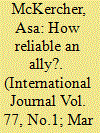

|
|
|
|
|
| Summary/Abstract |
The withdrawal of US forces from Afghanistan, and the subsequent collapse of the Western-backed Afghan government in August 2021, raised doubts in the United States and abroad about the limits and credibility of American power. For some observers, the situation seemed to parallel the fall of the South Vietnamese regime in April 1975. Given the comparisons being drawn between Saigon and Kabul, this brief paper examines a series of Canadian diplomatic reports produced in the wake of the events in South Vietnam. Addressing the question of how reliable the United States was as an ally, the conclusions drawn in these reports should give some pause to doomsaying about US security commitments. Although the contemporary situation differs from that of the mid-1970s, Canadian observers recognized that American power rested on a firm foundation.
|
|
|
|
|
|
|
|
|
|
|
|
|
|
|
|
| 18 |
ID:
073797
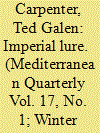

|
|
|
|
|
| Publication |
2006.
|
| Summary/Abstract |
The concept of nation building has a long pedigree in US foreign policy. It was an identifiable feature of Washington's dealings with the colonial empire it acquired in the Spanish-American War, especially with regard to the Philippines. The United States also conducted a nation-building mission lasting nearly two decades in Haiti-from 1915 to 1934.
|
|
|
|
|
|
|
|
|
|
|
|
|
|
|
|
| 19 |
ID:
071448
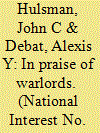

|
|
|
| 20 |
ID:
181595
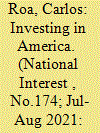

|
|
|
|
|
| Summary/Abstract |
If America is to find its way through its current troubles, we must look to our past and draw inspiration from the efforts of our forebears. It contains many salutary lessons which Congress and the Biden administration would do well to draw upon.
|
|
|
|
|
|
|
|
|
|
|
|
|
|
|
|
|
|
|
|
|